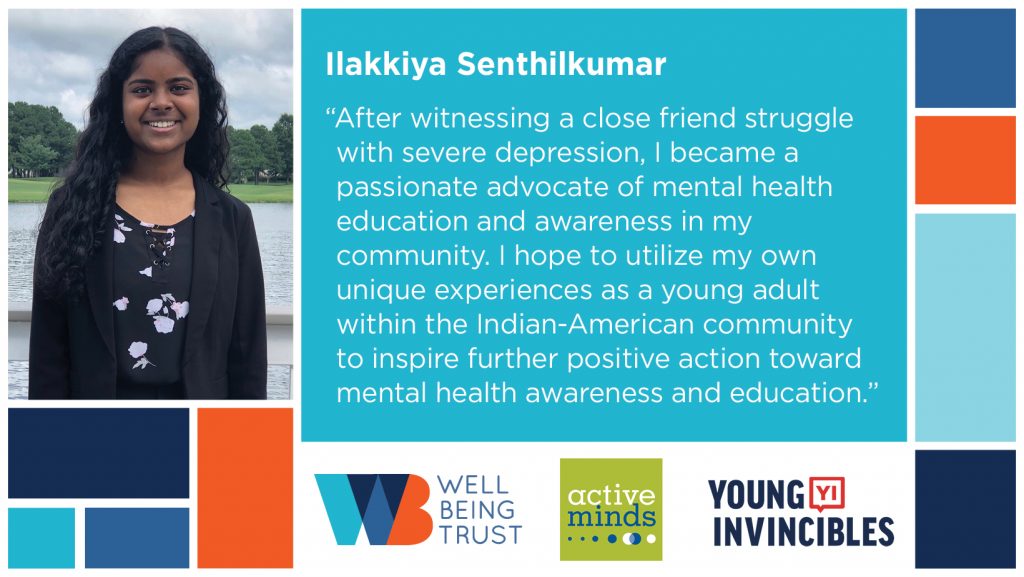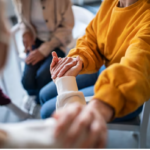Ilakkiya Senthilkumar, a junior attending Henrico High School, recently spoke about her childhood growing up in India and then later moving to the United States; her journey to find a sense of belonging without neglecting her mental health and well-being; and her mission to help others, particularly youth and minorities groups, to do the same.
“Growing up as an immigrant in this country, mental health was not seen as a priority and it was not a concept I thought to learn more about in my early life. After witnessing a close friend struggle with severe depression, I became a passionate advocate of mental health education and awareness in my community. I hope to contribute to the destigmatization of mental health and use my unique experiences as a young adult and person of color to inspire others to take positive action.”
Describe your early childhood in India and the steps you took to maintain your cultural identity after moving to the United States.
Growing up in India during my early childhood, I was raised in a vastly rich culture of vibrant colors, flavors, and traditions. While each day moved at an exhilarating pace, there was also a certain thrill to the controlled chaos of daily life in a busy city. My entire extended family, consisting of at least 20 cousins on both sides, all lived within close reach. I also thoroughly enjoyed frequent visits from relatives and enormous holiday gatherings filled with boisterous conversation and laughter.
It was only after moving to the United States, however, that I began to truly understand the privilege and significance of community. Following my family’s arrival in America, I was compelled to adapt to an entirely new culture and society, while desperately trying to maintain some level of connection with my family back home in India. Weekly video calls simply were not the same; my lack of connection to home soon led me to look for community in different ways.
I consistently strived to be involved in various Indian cultural events, and I surrounded myself with individuals of a similar background, in hopes to reconcile the parts of my cultural identity I had lost after shifting my life across the world.
How did moving to the U.S. and being immersed in another culture impact you, your sense of self, and your overall well-being?
My continuous attempts to find belonging soon established an unhealthy mindset of trying to satisfy others’ every expectation. It became somewhat of a responsibility to accommodate myself to others, while successfully conforming to their preconceived expectations. This thought-process led me to arrive at the false realization that the needs of the community always held higher priority than the needs of the individual.
This, in turn, maximized my fear of failing to meet a certain standard, and eventually prevented me from reaching out for help when I most needed it.
My journey to develop this belief may have been unique, but it remains a dangerous view that negatively impacts the mental health of numerous individuals. The personal minimization or neglect of one’s own well-being is especially prevalent within the BIPOC (Black, Indigenous, People of Color) community, as well as additional racial and ethnic minority groups, where ideals of hard work and maintaining an “honorable” reputation are often valued before personal health.
The increased obstacles that individuals of minority groups are subject to endure is an indication of the highly influential role of identity in mental health. Although mental illness does not discriminate based on factors such as age, gender, race, or sexual orientation, every individual’s complex and intersectional identity plays a prominent role in their unique mental health experience.
What are some steps individuals can take to help a family member or friend to reach out and seek support?
When trying to understand a different perspective, the most valuable actions to take are generally focused on making the other individual feel comfortable and heard. Maintaining an open mind and offering your time to someone who is willing to share their story can enable them to feel significantly less alone in their experience, as well as make you more aware and informed.
In order to help ensure a rewarding conversation for all who are involved, make sure to remain attentive by asking respectful and thoughtful questions:
- What are some challenges you encountered?
- What are some successes you experienced?
- What change do you hope to see in the future?
- How can I best help you in achieving said change?
The next step to expanding your understanding beyond awareness is to continue to learn from additional educational resources. Working toward the development of extensive and inclusive mental health care for minority communities requires an in-depth understanding of the issues they face, as well as the most competent methods of offering necessary support and treatment.
This can include reading informational blog posts, listening to mental health professionals from minority communities, and researching culturally and linguistically conscious language to use.
Once you have gained insight into other’s stories and done individual research, you can equip others with this knowledge by continuing to have discussions within your own communities. It is highly important to amplify the voices of the underrepresented, and share valuable resources, in order to enable others to develop a culturally informed understanding of mental health.
Despite the initial difficulty you may face, considering the present stigma against mental health, continuously talking about these topics will only serve to normalize them and make them easier to address.
Another way to elevate conversation into policy-driven change is to contact your state representatives. Through a simple phone call or email to your legislators, you can directly advocate for specific mental health issues faced by underserved communities.
Some resources that have been helpful to me include:
- Identity and Cultural Dimensions |
- Mental health resources for underrepresented communities
- Bebe Moore Campbell National Minority Mental Health Awareness Month | NAMI: National Alliance on Mental Illness
- Mental-Health-Facts-for-Diverse-Populations.pdf
- Getting Involved with Minority Mental Health
In order to continue advancing on the path toward equitable access to quality mental health care and treatment for all individuals of minority communities, it is our responsibility to take notice, educate, and speak out.
Active Minds, Young Invincibles, and Well Being Trust recently welcomed 20 young adults to the National Mental Health Advisory Board. Ilakkiya Senthilkumar is a member of the Advisory Board.






